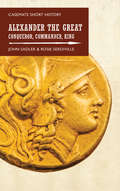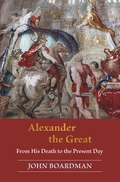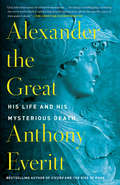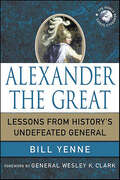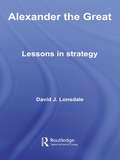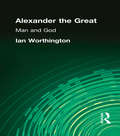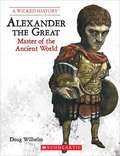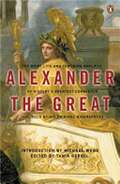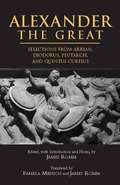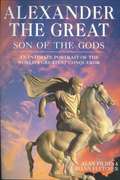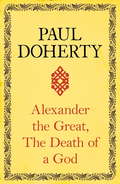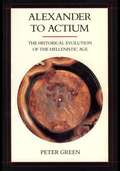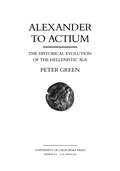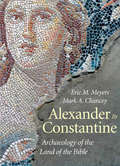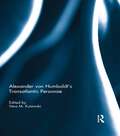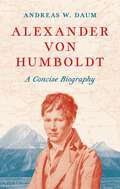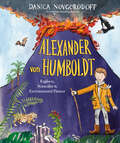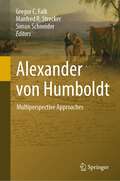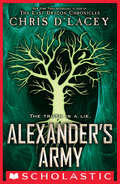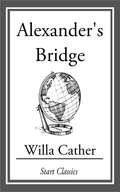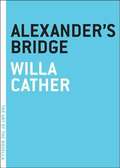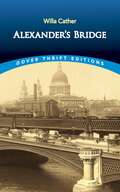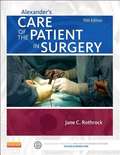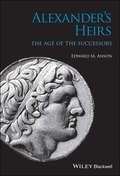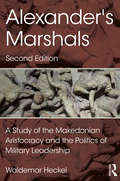- Table View
- List View
Alexander the Great: Conqueror, Commander, King (Casemate Short History)
by John Sadler Rosie SerdivilleAn overview of Alexander&’s life—from his early military exploits to the creation of his empire and the legacy left after his premature death. Alexander was perhaps the greatest conquering general in history. In a dozen years, Alexander took the whole of Asia Minor and Egypt, destroyed the once mighty Persian Empire, and pushed his army eastwards as far as the Indus. No one in history has equaled his achievement. Much of Alexander&’s success can be traced to the Macedonian phalanx, a close-ordered battle formation of sarissa-wielding infantry that proved itself a war-winning weapon. The army Alexander inherited from his father was the most powerful in Greece—highly disciplined, trained, and loyal only to the king. United in a single purpose, they fought as one. Cavalry was also of crucial importance in the Macedonian army as the driving force to attack the flanks of the enemy in battle. A talented commander able to anticipate how his opponent would think, Alexander understood how to commit his forces to devastating effect and was never defeated in battle. He also developed a corps of engineers that utilized catapults and siege towers against enemy fortifications. Alexander led from the front, fighting with his men, eating with them, refusing water when there was not enough, and his men would quite literally follow him to the ends of the (known) world. None of his successors were able to hold together the empire he had forged. Although he died an early death, his fame and glory persist to this day.
Alexander the Great: From His Death to the Present Day
by John BoardmanAn illustrious scholar presents an elegant, concise, and generously illustrated exploration of Alexander the Great’s representations in art and literature through the agesJohn Boardman is one of the world’s leading authorities on ancient Greece, and his acclaimed books command a broad readership. In this book, he looks beyond the life of Alexander the Great in order to examine the astonishing range of Alexanders created by generations of authors, historians, and artists throughout the world—from Scotland to China.Alexander’s defeat of the Persian Empire in 331 BC captured the popular imagination, inspiring an endless series of stories and representations that emerged shortly after his death and continues today. An art historian and archaeologist, Boardman draws on his deep knowledge of Alexander and the ancient world to reflect on the most interesting and emblematic depictions of this towering historical figure.Some of the stories in this book relate to historical events associated with Alexander’s military career and some to the fantasy that has been woven around him, and Boardman relates each with his customary verve and erudition. From Alexander’s biographers in ancient Greece to the illustrated Alexander “Romances” of the Middle Ages to operas, films, and even modern cartoons, this generously illustrated volume takes readers on a fascinating cultural journey as it delivers a perfect pairing of subject and author.
Alexander the Great: His Life and His Mysterious Death
by Anthony EverittWhat can we learn from the stunning rise and mysterious death of the ancient world’s greatest conqueror? An acclaimed biographer reconstructs the life of Alexander the Great in this magisterial revisionist portrait.“Reads as easily as a novel . . . Nearly unparalleled insight into the period and the man make this a story for everyone.”—Kirkus Reviews (starred review) More than two millennia have passed since Alexander the Great built an empire that stretched to every corner of the ancient world, from the backwater kingdom of Macedonia to the Hellenic world, Persia, and ultimately to India—all before his untimely death at age thirty-three. Alexander believed that his empire would stop only when he reached the Pacific Ocean. But stories of both real and legendary events from his life have kept him evergreen in our imaginations with a legacy that has meant something different to every era: in the Middle Ages he became an exemplar of knightly chivalry, he was a star of Renaissance paintings, and by the early twentieth century he’d even come to resemble an English gentleman. But who was he in his own time? In Alexander the Great, Anthony Everitt judges Alexander’s life against the criteria of his own age and considers all his contradictions. We meet the Macedonian prince who was naturally inquisitive and fascinated by science and exploration, as well as the man who enjoyed the arts and used Homer’s great epic the Iliad as a bible. As his empire grew, Alexander exhibited respect for the traditions of his new subjects and careful judgment in administering rule over his vast territory. But his career also had a dark side. An inveterate conqueror who in his short life built the largest empire up to that point in history, Alexander glorified war and was known to commit acts of remarkable cruelty. As debate continues about the meaning of his life, Alexander's death remains a mystery. Did he die of natural causes—felled by a fever—or did his marshals, angered by his tyrannical behavior, kill him? An explanation of his death can lie only in what we know of his life, and Everitt ventures to solve that puzzle, offering an ending to Alexander’s story that has eluded so many for so long.
Alexander the Great: Lessons from History's Undefeated General (World Generals Series)
by Bill YenneWhen the Oracle of Delphi told Alexander the Great that he was invincible, it was right. The son of the great King Philip II of Macedonia, Alexander was educated by Aristotle and commanded a wing of his father's army in the victory over the Thebans and Athenians at the Battle of Chaeronea—all when he was still just a teenager. By the time of his death at age 32, he had amassed an empire that stretched from the Adriatic Sea to the Indus River and included all of Persia and most of Egypt. He ruled as both the shah of Persia and as a pharaoh of Egypt by right of conquest, and he was also crowned king of Asia. Here, historian Bill Yenne illuminates the legendary vision of this classical hero. Exhibiting the best traits of a battlefield leader, Alexander was audacious, aggressive, fearless and victorious. His unfailing integration of strategic vision and tactical genius took him to the ends of the earth, and into immortality as a military leader. Alexander's influence on cultural and political history and the scope of his military prowess remains awe-inspiring to this day.
Alexander the Great: Lessons in Strategy (Strategy and History)
by David J. LonsdaleThis book offers a strategic analysis of one of the most outstanding military careers in history, identifying the most pertinent strategic lessons from the campaigns of Alexander the Great. David Lonsdale argues that since the core principles of strategy are eternal, the study and analysis of historical examples have value to the modern theorist and practitioner. Furthermore, as strategy is so complex and challenging, the remarkable career of Alexander provides the ideal opportunity to understand best practice in strategy, as he achieved outstanding and continuous success across the spectrum of warfare, in a variety of circumstances and environments. This book presents the thirteen most pertinent lessons that can be learned from his campaigns, dividing them into three categories: grand strategy, military operations, and use of force. Each of these categories provides lessons pertinent to the modern strategic environment. Ultimately, however, the book argues that the dominant factor in his success was Alexander himself, and that it was his own characteristics as a strategist that allowed him to overcome the complexities of strategy and achieve his expansive goals.
Alexander the Great: Man and God
by Ian WorthingtonAlexander the Great conquered territories on a superhuman scale and established an empire that stretched from Greece to India. He spread Greek culture and education throughout his empire, and was worshipped as a living god by many of his subjects. But how great is a leader responsible for the deaths on tens of thousands of people? A ruler who prefers constant warring to administering the peace? A man who believed he was a god, who murdered his friends, and recklessly put his soldiers lives at risk? Ian Worthington delves into Alexander's successes and failures, his paranoia, the murders he engineered, his megalomania, and his constant drinking. It presents a king corrupted by power and who, for his own personal ends, sacrificed the empire his father had fought to establish.
Alexander the Great: Master of the Ancient World
by Doug WilhelmA Wicked History is the definitive biography series for middle and high school students on the evil individuals who twisted the course of history. Newly revised editions include additional resources that supplement and support the core text.
Alexander the Great: Selected Texts from Arrian, Curtius and Plutarch
by Plutarch Arrian Quintus Curtius RufusInspired in his leadership, fearless in battle, and boundless in his ambition, Alexander the Great was worshiped as a god during his lifetime, and his legend has only grown since. Inheriting his father's empire at the age of twenty, Alexander resolved to expand it, and by the time of his death at thirty-two, his empire streched from Greece to India, spanning three continents and encompassing two million square miles. <p><p> Comprising selections from the writings of Arrian, Plutarch, and Quintus Curtius Rufus, this definitive biography of the greatest conqueror in history features an introduction on Alexander's enduring legacy by acclaimed British television personality and Princeton University Professor Michael Wood.
Alexander the Great: Selections From Arrian, Diodorus, Plutarch, and Quintus Curtius
by Plutarch James Romm Pamela Mensch Arrian Diodorus Quintus CurtiusComprised of relevant selections from the writings of four ancient historians, this volume provides a complete narrative of the important events in the life of Alexander the Great. The Introduction sets these works in historical context, from the conclusion of the Peloponnesian War through Alexander's conquest of Asia, and provides an assessment of Alexander's historical importance, as well as a survey of the central controversies surrounding his personality, aims and intentions. Includes a timeline, maps, bibliography, glossary, and index.
Alexander the Great: Son of the Gods
by Alan Fildes Joann FletcherThis book captures the sense of Alexander, his relationships and his achievements extremely well. Never ponderous, it nevertheless completely describes his singular achievements.
Alexander the Great: The Death of a God
by Paul DohertyWhat - or who - really killed the young conqueror of the known world?Master historian Paul Doherty investigates an outstanding figure who achieved so much before his premature end in this remarkable non-fiction work, Alexander the Great: The Death of a God. Perfect for fans of Philip Freeman and Robin Lane Fox.'Riveting... compelling... an important contribution to the literature on the period' - Sunday TimesAlexander the Great was an enigma, a man who wanted to be a god, a Greek who wanted to be Persian, a defender of liberties who spent most of his life taking away the liberties of others, and a king who could be compassionate yet also had the capacity to ruthlessly wipe out an ancient city. The Death of Alexander scrutinizes the circumstances surrounding the young king's death in the summer palace of the Persian kings. Did Alexander die of alcohol poisoning? Or where there other, more sinister factors involved? The great general had surrounded himself with outstanding captains of war. Was it they who ultimately made a decision to bring this young god's life to a violent, untimely end?What readers are saying about Paul Doherty:'Doherty proves that he is a scholar as well as a writer of novels''I could not stop reading this book by Paul Doherty as it is very well written, immensely readable and fascinating. For me an absolute MUST''Pure brilliance'
Alexander to Actium
by Peter GreenThe Hellenistic Age, the three extraordinary centuries from the death of Alexander in 323 B. C. to Octavian's final defeat of Antony and Cleopatra at the Battle of Actium, has offered a rich and variegated field of exploration for historians, philosophers, economists, and literary critics. Yet few scholars have attempted the daunting task of seeing the period whole, of refracting its achievements and reception through the lens of a single critical mind. Alexander to Actium was conceived and written to fill that gap. In this monumental work, Peter Green--noted scholar, writer, and critic--breaks with the traditional practice of dividing the Hellenistic world into discrete, repetitious studies of Seleucids, Ptolemies, Antigonids, and Attalids. He instead treats these successor kingdoms as a single, evolving, interrelated continuum. The result clarifies the political picture as never before. With the help of over 200 illustrations, Green surveys every significant aspect of Hellenistic cultural development, from mathematics to medicine, from philosophy to religion, from literature to the visual arts. Green offers a particularly trenchant analysis of what has been seen as the conscious dissemination in the East of Hellenistic culture, and finds it largely a myth fueled by Victorian scholars seeking justification for a no longer morally respectable imperialism. His work leaves us with a final impression of the Hellenistic Age as a world with haunting and disturbing resemblances to our own. This lively, personal survey of a period as colorful as it is complex will fascinate the general reader no less than students and scholars.
Alexander to Actium
by Peter GreenThe Hellenistic Age, the three extraordinary centuries from the death of Alexander in 323 B. C. to Octavian's final defeat of Antony and Cleopatra at the Battle of Actium, has offered a rich and variegated field of exploration for historians, philosophers, economists, and literary critics. Yet few scholars have attempted the daunting task of seeing the period whole, of refracting its achievements and reception through the lens of a single critical mind. Alexander to Actium was conceived and written to fill that gap.In this monumental work, Peter Green--noted scholar, writer, and critic--breaks with the traditional practice of dividing the Hellenistic world into discrete, repetitious studies of Seleucids, Ptolemies, Antigonids, and Attalids. He instead treats these successor kingdoms as a single, evolving, interrelated continuum. The result clarifies the political picture as never before. With the help of over 200 illustrations, Green surveys every significant aspect of Hellenistic cultural development, from mathematics to medicine, from philosophy to religion, from literature to the visual arts.Green offers a particularly trenchant analysis of what has been seen as the conscious dissemination in the East of Hellenistic culture, and finds it largely a myth fueled by Victorian scholars seeking justification for a no longer morally respectable imperialism. His work leaves us with a final impression of the Hellenistic Age as a world with haunting and disturbing resemblances to our own. This lively, personal survey of a period as colorful as it is complex will fascinate the general reader no less than students and scholars.
Alexander to Constantine
by Eric M. Meyers Mark A. ChanceyDrawing on the most recent, groundbreaking archaeological research, Eric M. Meyers and Mark A. Chancey re-narrate the history of ancient Palestine in this richly illustrated and expertly integrated book. Spanning from the conquest of Alexander the Great in the fourth century BCE until the reign of the Roman emperor Constantine in the fourth century CE, they synthesize archaeological evidence with ancient literary sources (including the Bible) to offer a sustained overview of the tumultuous intellectual and religious changes that impacted world history during the Greco-Roman period. The authors demonstrate how the transformation of the ancient Near East under the influence of the Greeks and then the Romans led to foundational changes in both the material and intellectual worlds of the Levant. Palestine's subjection to Hellenistic kingdoms, its rule by the Hasmonean and Herodian dynasties, the two disastrous Jewish revolts against Rome, and its full incorporation into the Roman Empire provide a background for the emergence of Christianity. The authors observe in the archaeological record how Judaism and Christianity were virtually undistinguishable for centuries, until the rise of imperial Christianity with Emperor Constantine. The only book-length overview available that focuses on the archaeology of Palestine in this period, this comprehensive and powerfully illuminating work sheds new light on the lands of the Bible.
Alexander von Humboldt's Transatlantic Personae
by Vera M. KutzinskiWho was Alexander von Humboldt? Was he really a lone genius? Was he another European apologist for colonialism in the Americas or the father of Latin American independence? Was he a roving Romanticist, or did his sensibilities belong to the Enlightenment? Naturalist, philosopher, historian, and proto-sociologist--to name just some of the fields to which he contributed--, Humboldt is impossible to contain in a single identity or definition. His voluminous writings range across so many different fields of knowledge that his scholarly-scientific personae multiplied even during his lifetime, and they have continued to proliferate since his death in 1859. A household word throughout the nineteenth century, Humboldt was eventually eclipsed by Charles Darwin (whose own travels had been motivated by Humboldt’s) and disappeared from view for much of the twentieth century, notably in the United States. The essays in this collection testify to the renewed interest that Alexander von Humboldt’s multi-faceted work is inspiring in the twenty-first century, especially among cultural and literary historians from both sides of the Atlantic. This book was originally published as a special issue of Atlantic Studies.
Alexander von Humboldt: A Concise Biography
by Andreas W. DaumAn engaging account of the life and work of the legendary polymath Alexander von HumboldtIn this lucid biography, Andreas Daum offers a succinct and novel interpretation of the life and oeuvre of Alexander von Humboldt (1769―1859). A Prussian nobleman born into the age of European Enlightenment, Humboldt was a contemporary of Napoleon, Simón Bolívar, and Charles Darwin. As a naturalist and scholar, he traveled the world, from the Americas to Central Asia, and recorded his observations in multiple volumes. Humboldt is still admired today for his interdisciplinary outreach and ecological awareness.Moving beyond the conventional views of Humboldt as either intellectual superhero or gentleman colonizer, Daum&’s incisive account focuses on Humboldt in the context of the tumultuous period of history in which he lived. Humboldt embodied the contradictions that marked the age of Atlantic Revolutions. He became a critic of slavery and embraced the emerging civil society but remained close to authoritarian rulers. He dedicated his life to scientific research yet was driven by emotional impulses and pleaded for an aesthetic appreciation of nature. Daum introduces a man passionately striving to establish a &“cosmic&” understanding of nature while grappling with the era&’s explosion of knowledge.This book provides the first concise biography of Humboldt, covering all periods of his life, exploring his personality, the vast range of his works, and his intellectual networks. Daum helps us understand Humboldt as a seminal historical figure and illuminates the role of science at the dawn of the global world.
Alexander von Humboldt: Explorer, Naturalist & Environmental Pioneer
by Danica NovgorodoffBudding botanists, growing geologists, and early explorers will dive into this picture book biography about the father of ecology, Alexander von Humboldt. The captivating prose and art from a New York Times bestselling illustrator will spark a passion for discovery and conservation in the youngest readers.Whether sailing across the ocean, hiking through the jungle, or climbing the highest volcanic peaks, everywhere Alexander went, he observed the land, animals, and culture. And where others saw differences, Alexander spotted connections. Discover the incredible life of naturalist Alexander von Humboldt, whose explorations created the basis for modern ecology, whose travels made him one of the most famous scientists of his day, and whose curiosities have inspired generations of creative thinkers.
Alexander von Humboldt: Multiperspective Approaches
by Gregor C. Falk Manfred R. Strecker Simon SchneiderThis book aims to view and to understand Alexander von Humboldt from different perspectives and in varying disciplinary contexts. His contributions addressed numerous topics in the earth but also life sciences—spanning from geo-botany, climatology, paleontology, oceanography, mineralogy, resources, and hydrogeology to links between the environmental impact of humans, erosion, and climate change. From the very beginning, he paved the way for a modern, integrated earth system science approach to decipher, characterize, and model the different forcing factors and their feedback mechanisms. It becomes obvious that Humboldt’s holistic approach is far beyond simple description and empiric data collection. As documented and analyzed in the different texts of this volume, he combines observation and analysis with emotions and subjective perceptions in a very affectionate way. However, this publication does not intend to add another encyclopedic text compilation but to observe and critically analyze this unique personality´s relevance in a modern context, particularly in discussing environmental and social key issues in the twenty-first century.
Alexander's Army: Alexander's Army (UNICORNE Files)
by Chris d'LaceyFrom the NEW YORK TIMES bestselling author of the LAST DRAGON CHRONICLES comes an action-packed paranormal adventure full of mystery, alternate realities, thrills and chills.When Michael Malone is assigned a new mystery to solve by the UNICORNE agency, he knows he's in for another strange and deadly adventure. This time, he is sent to a local comic shop, where UNICORNE agents have detected unusual activity -- specifically the prominent display of a comic book starring a disturbingly familiar heroine. . . .The more Michael investigates the comic shop, however, the more he realizes that something much more sinister lurks within its walls. An invisible army has come to life, with a menacing maniac at its head. Even worse, Michael gets the sense that some of his fellow UNICORNE agents cannot be trusted, and that his own life may be in danger. Can he solve the case and defeat his enemies before it's too late? And is he any closer to finding his missing father? From NEW YORK TIMES bestselling author Chris d'Lacey comes the action-packed second installment in the remarkable and thrilling UNICORNE Files series!
Alexander's Bridge
by Willa CatherBartley Alexander, a construction engineer, is a middle-aged man torn between Winifred, his demanding American wife, and Hilda Burgoyne, his alluring British mistress. Alexander's relationship with Hilda erodes his sense of honor and eventually proves disastrous when a bridge he is constructing begins to collapse. Alexander's Bridge is an instructive, thought-provoking study of a man's growing awareness of his loss of integrity. Newly designed and typeset in a modern 6-by-9-inch format by Waking Lion Press.
Alexander's Bridge
by Willa CatherThe characteristic themes of Cather's mature work are already present in her debut novella, an evocation of a tragic love triangle. Bartley Alexander, renowned engineer of bridges, is a man with a past who "looked as a tamer of rivers ought to look. <P> <P> " Discovered by his mentor "sowing wild oats in London," he returned to America and the commission that made his name. Now, married to his wife of ten years, a chance encounter with actress Hilda Burgoyne, an almost forgotten love from his past, prompts a doomed attempt to recapture the boundlessness of his youth. *** This is a Hybrid Book. Melville House HybridBooks combine print and digital media into an enhanced reading experience by including with each title additional curated material called Illuminations -- maps, photographs, illustrations, and further writing about the author and the book. The Melville House Illuminations are free with the purchase of any title in the HybridBook series, no matter the format. Purchasers of the print version can obtain the Illuminations for a given title simply by scanning the QR code found in the back of each book, or by following the url also given in the back of the print book, then downloading the Illumination in whatever format works best for you. Purchasers of the digital version receive the appropriate Illuminations automatically as part of the ebook edition. "From the Trade Paperback edition. "
Alexander's Bridge
by Willa CatherConstruction engineer and world-renowned bridge builder Bartley Alexander has everything in mid-life: wealth, good looks, and fame. Yet he finds himself restless and discontented with life — until he meets a former love from his student days and resumes his relationship with her.Living a double life, Alexander is torn between Winifred, his American wife — a cold woman with clearly defined standards — and Hilda Burgoyne, his alluring mistress in London who helps him recapture his youth and sense of freedom. Alexander's affair, which eventually gnaws away at his sense of propriety and honor, proves disastrous.Willa Cather's first novel — a fascinating study of a man's growing awareness of the breach in his integrity—is essential reading for fans of this great American novelist.
Alexander's Care of the Patient in Surgery
by Jane C. RothrockAlexander's Care of the Patient in Surgery is the most dependable source for comprehensive perioperative information. Well-known author and educator, Jane C. Rothrock, continues to provide step-by-step instructions for over 400 surgical procedures, including many minimally invasive methods, all backed by the latest research. More than 1,000 full-color illustrations and photos depict current techniques, as well as surgical anatomy and instrumentation. This edition adds cutting-edge information to reflect new concepts for both invasive and non-invasive surgical procedures, whether the location is in a hospital, outpatient clinic, or doctor''s office. Over 400 specialty surgical interventions are included, as well as many minimally-invasive surgical procedures. A clear and consistent chapter format makes it easy to find information, including general discussions of surgical anatomy and perioperative nursing considerations, followed by more specific discussions of procedural considerations and operative procedure for each surgical intervention. Cutting-edge information keeps you up-to-date with the latest technological advances related to surgical procedures, both invasive and non-invasive, whether the location is in a hospital, outpatient clinic, or in a doctor''s office. Updated coverage includes new surgical procedures and techniques, new care standards, and the importance of integrating evidence and research into patient care. 1,000 full-color illustrations and photos show surgical anatomy, procedures, and methods. Comprehensive discussions of perioperative nursing considerations cover assessment, nursing diagnosis, outcome identification, planning, implementation, evaluation, patient and family education, and discharge planning. Full-color design highlights special features and makes it easier to focus on essential concepts. Patient Safety boxes highlight Joint Commission initiatives and important safety topics. Evidence for Practice boxes apply scientific research to perioperative nursing. Research Highlight boxes provide the latest research and apply it to patient care. Patient and Family Education boxes include specific guidelines for preprocedural and postprocedural care, side effects and complications, home care, discharge/follow-up care, psychosocial care, and referrals. Surgical Pharmacology tables summarize and offer quick reference to the drugs most commonly used for specific surgical procedures, including generic and trade names, purpose/description, and pharmacokinetics. Ambulatory Surgery Consideration boxes highlight patient selection criteria, special anesthesia considerations, and patient assessment implications for outpatient surgical procedures. Sample plans of care include nursing diagnosis, outcome, and interventions, linking specific interventions to clearly identified outcomes. An emphasis on patient and workplace safety includes protocols from the major safety agencies and coalitions, perioperative nursing safety issues, patient rights, and safe patient handling and movement. Coverage of cross-specialty areas includes special considerations for pediatric, geriatric, and trauma surgeries, as well as interventional and image-guided procedures, and complementary and alternative therapy. NEW and UNIQUE! Patient-Centered Care boxes feature simplified conversations that you can have with patients to help them better understand their surgical procedure. NEW! A Critical Thinking Question at the end of every chapter tests your understanding of chapter content. NEW! Key Points at the end of every chapter help you retain important concepts from the text. NEW! Laboratory Values appendix contains all laboratory value information in one convenient location
Alexander's Heirs
by Edward M. AnsonAlexander's Heirs offers a narrative account of the approximately forty years following the death of Alexander the Great, during which his generals vied for control of his vast empire, and through their conflicts and politics ultimately created the Hellenistic Age.Offers an account of the power struggles between Alexander's rival generals in the forty year period following his deathDiscusses how Alexander's vast empire ultimately became the Hellenistic WorldMakes full use of primary and secondary sourcesAccessible to a broad audience of students, university scholars, and the educated general readerExplores important scholarly debates on the Diadochi
Alexander's Marshals: A Study of the Makedonian Aristocracy and the Politics of Military Leadership
by Waldemar HeckelThis substantially revised and updated second edition of The Marshals of Alexander’s Empire (1992) examines Alexander’s most important officers, who commanded army units and were involved in military and political deliberations. Chapters on these men have been expanded, giving greater attention to personalities, bias in the sources, and the social as well as military setting, including more on familial connections and regional origins in an attempt to create a better understanding of factions. The major confrontations, military and political, are treated in greater detail within the biographies, and a discussion of the organization and command structure of the Makedonian army has been added.
